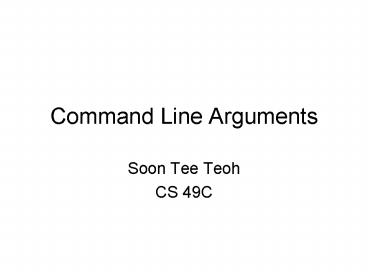Command Line Arguments PowerPoint PPT Presentation
Title: Command Line Arguments
1
Command Line Arguments
- Soon Tee Teoh
- CS 49C
2
The main( ) function
- So far, we have been defining the main() function
to receive no arguments. - Actually, the main( ) function can receive two
arguments. - To do that, the main( ) function should be
defined as below. - This is how arguments can be passed in at the
command line.
int main(int argc, char argv )
3
Command Line Arguments
- From the command prompt, we can start running a
program by typing its name and pressing ENTER. - To pass arguments, we type in the programs name
followed by some arguments, then press ENTER. - Below is an example from the Unix command prompt.
myprog
myprog 5 23
4
argc and argv
- When the program is called from the command line
with arguments, argc will contain the number of
arguments. - When the user types in arguments, the user
separates each argument with a space. - argv is an array of character strings.
- argv1 is the character string containing the
first argument, argv2 the second, etc. - Note argv0 contains the character string that
is the name of the executable.
5
Example
int main(int argc, char argv) int
i for (i 1 i lt argc i)
printf("s ", argvi) printf("\n")
return 0
6
Using sscanf to get floats and ints
- Suppose you expect an integer and a floating
point number as command line arguments. - They will be put in argv1 and argv2
respectively. - Use sscanf to get their values.
int main(int argc, char argv) int
n float f sscanf(argv1,
d, n) sscanf(argv2, f, f)
PowerShow.com is a leading presentation sharing website. It has millions of presentations already uploaded and available with 1,000s more being uploaded by its users every day. Whatever your area of interest, here you’ll be able to find and view presentations you’ll love and possibly download. And, best of all, it is completely free and easy to use.
You might even have a presentation you’d like to share with others. If so, just upload it to PowerShow.com. We’ll convert it to an HTML5 slideshow that includes all the media types you’ve already added: audio, video, music, pictures, animations and transition effects. Then you can share it with your target audience as well as PowerShow.com’s millions of monthly visitors. And, again, it’s all free.
About the Developers
PowerShow.com is brought to you by CrystalGraphics, the award-winning developer and market-leading publisher of rich-media enhancement products for presentations. Our product offerings include millions of PowerPoint templates, diagrams, animated 3D characters and more.

